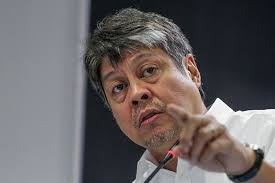MANILA, Philippines – A sprawling, sophisticated network of Chinese smuggling syndicates allegedly operating in direct collusion with Filipino businessmen and corrupt government officials is facilitating the massive, unchecked influx of illegal agricultural products into the country, according to explosive claims made by Senator Francis “Kiko” Pangilinan.
During the continuation of a public hearing held by the Senate Committee on Agriculture, Food and Agrarian Reform on Monday, October 20, 2025, Senator Pangilinan asserted that the activities being investigated far exceed typical smuggling. He characterized them instead as a grave “betrayal of Filipino farmers,” resulting in economic sabotage and the undermining of domestic food security.

The Anatomy of a Betrayal: Circumstantial Evidence and Collusion
Senator Pangilinan stated that there is already “sufficient circumstantial evidence to believe” in the existence of an institutionalized smuggling apparatus. This system, he claims, relies on a three-pronged alliance: powerful Chinese syndicates providing the supply; unscrupulous local businessmen handling the logistics and documentation; and a protective umbrella of corrupt government personnel ensuring smooth operation.
“We are looking at Chinese smuggling syndicates, in connivance with local businessmen, protected by a number of employees and officials of the government,” Pangilinan declared in his opening statement. He painted a picture of a criminal enterprise so entrenched that it operates with near impunity, using legitimate government channels as conduits for illegal trade.
The senator directly named several key government agencies whose employees or officials are allegedly involved in allowing these “Chinese smugglers and local partners to operate freely.” The agencies cited include:
The Bureau of Customs (BOC)
The National Bureau of Investigation (NBI)
The Philippine National Police (PNP)
The Department of Agriculture (DA)
The Bureau of Immigration (BI)
The Department of Justice (DOJ)
The inclusion of law enforcement and justice departments, such as the NBI, PNP, and DOJ, suggests the conspiracy is not merely about misdeclaration at the ports, but also involves the systematic obstruction of justice and manipulation of investigations.
The Illusion of Enforcement: Raids and Lack of Prosecution
A critical point raised by Senator Pangilinan focused on the perceived failure of the government’s counter-smuggling efforts. He contended that the occasional, highly-publicized raids and seizures are often conducted merely to “create an illusion of enforcement.”
Crucially, he lamented that despite repeated discoveries of large-scale smuggling operations and mountains of evidence, “no major smuggler has ever gone to jail” for economic sabotage. This lack of high-profile prosecutions suggests that the true masterminds behind the syndicates are either too well-protected or that the legal and enforcement mechanisms are intentionally being rendered ineffective. The absence of convictions sends a clear signal to criminal groups that the financial rewards of smuggling outweigh the risk of punishment.
Case in Point: Frozen Mackerel Misdeclared as “Chicken Poppers”
To illustrate the brazen nature of the misdeclaration schemes, Pangilinan highlighted a recent incident at the Port of Subic. Investigators uncovered a ₱68-million shipment of frozen mackerel that had been deceitfully declared as “chicken poppers” with an undervaluation of ₱40 million. The shipment, allegedly originating from China, exemplifies the syndicates’ strategy of exploiting tariff loopholes and avoiding proper sanitary and phytosanitary inspections, which pose risks to public health and severely damage the market for local fishers.
The senator emphasized that these misdeclaration schemes cost the government billions in lost revenue, but the deeper impact is the decimation of the local farming and fishing sectors, unable to compete with cheap, illegal, and often substandard imports.
Contempt Citations and Allegations of Perjury

The Senate hearing quickly escalated into confrontation, resulting in three individuals being held in contempt for allegedly impeding the legislative inquiry.
Two of those cited were Bureau of Customs (BOC) officials, accused of giving false statements under oath regarding the mackerel shipment:
-
Andrew Calixihan, Deputy Collector for Assessment at the Port of Subic, was held in contempt for his evasive and allegedly untruthful testimony concerning the fraudulent declaration.
A BOC Customs Operations Officer III at the same port was similarly cited for perjury, underscoring the committee’s belief that there was an organized effort within the agency to cover up or obscure the facts of the illegal trade.
The third individual cited was Erwin Pascual, the purported owner of EPCB Consumer Goods Trading, the consignee involved in the smuggling operation. Pascual was questioned about the highly irregular setup of his business, which was allegedly registered under the name of his nephew, Dexter Sonza Juala, a food delivery rider.
Pascual’s defense—that he intended to “teach his nephew about brokering”—was immediately undermined by Juala’s own testimony. Juala categorically denied ever meeting the brokers or taking any active part in the business operations, strengthening the committee’s suspicion that his name was merely used as a dummy to shield the real operators from legal accountability.
The Senate’s investigation suggests that the problem of agricultural smuggling is deeply rooted, requiring not just stricter enforcement, but a massive and sustained political will to dismantle a system of corruption that has effectively weaponized the supply chain against the nation’s own farmers.





